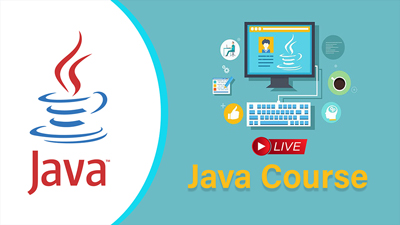 Live Classes
Live Classes
Best Java Course Course (Online Classes)
4.9 (24922 Reviews)A Java course typically provides comprehensive instruction in one of the most popular and versatile programming languages used across various domains, from software development to web applications and mobile development. Such a course equips learners with fundamental and advanced concepts essential to becoming proficient Java developers.
Learn More →
Buy Courses
Upcoming Batch Details
Duration
- (Mon - Sat) 5 Months
- (Mon - Sat) 5 Months
- (Mon - Sat) 5 Months
- (Mon - Sat) 5 Months
- (Mon - Sat) 5 Months
Timings
- 9:00 AM to 10:00 AM
- 10:00 AM to 11:00 AM
- 4:00 PM to 5:00 PM
- 5:00 PM to 6:00 PM
- 6:00 PM to 7:00 PM
Course Fees
Get 50% off
Exciting Offer till 06 Nov
Find Course Fees →No Cost EMI options available
Overview of Our Java Development Course in Jodhpur
The course usually begins with an introduction to Java programming basics, covering topics like variables, data types, control structures (loops, conditionals), and methods/functions. Learners grasp the object-oriented programming (OOP) principles integral to Java, such as classes, objects, inheritance, polymorphism, and encapsulation.
As the course progresses, participants delve into more advanced Java concepts like exception handling, multithreading, file I/O operations, and generics. They learn about Java Collections Framework, including lists, maps, sets, and their applications to manage and manipulate data efficiently.
Furthermore, Java courses often include modules on graphical user interface (GUI) development using Swing or JavaFX, enabling learners to create interactive and user-friendly applications. These modules cover event handling, layouts, and components crucial in building desktop applications.
Advanced topics like JDBC (Java Database Connectivity) for database interaction, network programming, servlets, and JSP (JavaServer Pages) for web development are also commonly included in more comprehensive Java courses. Learners gain insights into building web applications, connecting to databases, and understanding server-side programming.

Curriculum of Java Development Course
Well-structured & comprehensive curriculum designed according to latest trends and industry standards!
-
Overview of Java
-
History and Evolution:
- Java's origin and its role in the evolution of programming languages.
- Introduction to James Gosling and the development of Java at Sun Microsystems.
-
Key Features:
- Platform independence and the role of the Java Virtual Machine (JVM).
- Object-oriented programming (OOP) principles in Java.
- Automatic memory management with garbage collection.
-
History and Evolution:
-
Setting up the Development Environment
-
Installing JDK:
- Step-by-step guide on downloading and installing the Java Development Kit (JDK).
- Verifying the installation and setting environment variables.
-
Configuring IDE (Eclipse, IntelliJ):
- Overview of popular Java Integrated Development Environments (IDEs).
- Setting up a project, creating packages, and managing dependencies.
-
Installing JDK:
-
Basic Java Concepts
-
Variables and Data Types:
- Understanding primitive data types and their usage.
- Declaring and initializing variables in different scopes.
-
Control Flow: Loops and Conditional Statements:
- Exploring 'if', 'else', 'switch' statements.
- Mastery of 'for', 'while', and 'do-while' loops.
-
Methods and Functions:
- Writing methods with parameters and return values.
- Method overloading and the concept of varargs.
-
Variables and Data Types:
-
Classes and Objects
-
Defining Classes:
- Encapsulation and the concept of class members (fields and methods).
- Constructors and their role in object instantiation.
-
Object Inheritance:
- Extending classes and the 'extends' keyword.
- Superclasses and subclasses relationships.
-
Polymorphism:
- Overriding methods and implementing interfaces.
- Understanding dynamic method dispatch.
-
Defining Classes:
-
Encapsulation and Access Modifiers
-
Private, Protected, Public:
- Controlling access to class members using access modifiers.
- Best practices for encapsulation and information hiding.
- Getters and Setters:
- Implementing accessor and mutator methods.
- Advantages of using getters and setters for data encapsulation.
-
Private, Protected, Public:
-
Try-Catch Blocks:
- Handling exceptions and preventing program crashes.
- Checked vs. unchecked exceptions.
-
Custom Exceptions:
- Creating custom exception classes.
- Throwing and catching custom exceptions.
-
Multithreading
-
Thread Creation and Synchronization:
- Creating and managing threads in Java.
- Synchronized methods and blocks for thread safety.
-
Concurrency Issues and Solutions:
- Deadlocks, race conditions, and how to avoid them.
- Using locks and other synchronization mechanisms.
-
Thread Creation and Synchronization:
-
Collections Framework
-
Lists, Sets, Maps:
- Understanding different collection types.
- Choosing the right collection for specific use cases.
-
Iterators and Comparators:
- Iterating through collections using iterators.
- Custom sorting with comparators.
-
Lists, Sets, Maps:
-
File Input/Output
-
Reading and Writing to Files:
- Working with File and FileWriter/FileReader classes.
- Buffering for improved I/O performance.
-
Serialization:
- Converting objects to bytes for storage or transmission.
- Implementing Serializable interface.
-
Reading and Writing to Files:
-
Streams and Readers/Writers
-
Byte Streams vs. Character Streams:
- Understanding the difference between InputStream/OutputStream and Reader/Writer.
- Choosing the right stream for different scenarios.
-
Byte Streams vs. Character Streams:
-
Introduction to Databases
-
Relational Databases:
- Basics of relational databases and SQL.
- Common database management systems (e.g., MySQL, Oracle, PostgreSQL).
-
SQL Basics:
- SELECT, INSERT, UPDATE, DELETE queries.
- Joins, indexes, and transactions.
-
Relational Databases:
-
JDBC Fundamentals
-
Connecting to Databases:
- Establishing JDBC connections.
- CRUD operations using JDBC statements.
-
Executing Queries and Updates:
- Retrieving data with ResultSets.
- Batch processing and prepared statements.
-
Connecting to Databases:
-
Servlets
-
Handling HTTP Requests:
- Understanding the servlet lifecycle.
- HttpServletRequest and HttpServletResponse.
-
Session Management:
- Using session attributes and cookies.
- Session listeners and filters.
-
Handling HTTP Requests:
-
JavaServer Pages (JSP)
-
Integrating Java Code into Web Pages:
- Embedding Java code in JSP.
- JSP expressions, declarations, and scriptlets.
-
JSP Directives and Actions:
- Using directives for page configuration.
- JSP actions for dynamic content generation.
-
Integrating Java Code into Web Pages:
-
Introduction to Spring
-
Dependency Injection:
- Understanding IoC (Inversion of Control).
- Configuring and using the Spring IoC container.
-
Inversion of Control (IoC):
- Benefits of IoC in application development.
- ApplicationContext and BeanFactory.
-
Dependency Injection:
-
Spring Boot
-
Creating RESTful Services:
- Building REST APIs with Spring Boot.
- Handling HTTP methods and request parameters.
-
Microservices Architecture:
- Overview of microservices.
- Spring Cloud for building cloud-native applications.
-
Creating RESTful Services:
-
JUnit
-
Writing and Running Test Cases:
- Creating JUnit test classes.
- Assert methods and annotations.
-
Test Suites:
- Grouping and executing multiple test cases.
- Parameterized tests.
-
Writing and Running Test Cases:
-
Mockito
-
Mocking in Unit Tests:
- Creating mock objects.
- Verifying method calls and behaviors.
-
Mocking in Unit Tests:
-
Maven
-
Project Management and Build Automation:
- Understanding the Project Object Model (POM).
- Dependency management and plugin configuration.
-
Project Management and Build Automation:
-
Jenkins
-
Continuous Integration and Deployment:
- Setting up Jenkins for automated builds.
- Integrating Jenkins with version
-
Continuous Integration and Deployment:
Why Choose Codelearn.academy ?

Training by Pro Web Developers
In this course, you will get complete training and practice sessions from a professional and expert website developer who has 10+ years of experience in the field.

Most Comprehensive Curriculum
We offer the most detailed training, covering all aspects of web development in-depth. You learn both static and dynamic website development.

Intensive Classroom Training
To offer you the best learning experience, our classrooms are fully digitized, distraction-free, and provide 1:1 personal interaction with the mentor.

Hands-on 12 Live Projects
Web development is a skill that requires immense practice. For that, you will work on a total of 12 projects (both dynamic and static websites).

Job Assistance
We prepare you for the web development interview, and arrange your interviews with top companies so that you can kickstart your career instantly after the course.

Web Development Certification
Once your training is over, you get a professional certificate that you can add to your resume and easily explore promising career opportunities.
